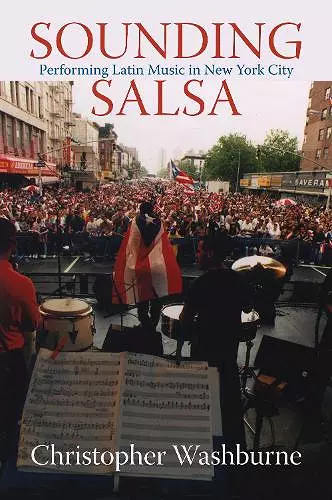Sounding Salsa
Performing Latin Music in New York City
Format:Paperback
Publisher:Temple University Press,U.S.
Published:15th Jun '08
Should be back in stock very soon

Takes you on an ethnographic journey into the New York salsa scene of the 1990s. Written by a musical insider and from the perspective of salsa musicians, this study offers detailed accounts of these musicians grappling with intercultural tensions and commercial pressures. It addresses a range of issues, musical and social.Examines how musicians navigated their everyday lives, grappling with the intercultural tensions and commercial pressures that were so pronounced on the salsa scene
"[Washburne] offers a no-holds-barred, insider glimpse at 'how salsa was made' in New York City in the 1990s. By challenging conventional narratives about salsa's development and taking on contentious issues in its history, including drugs, violence and illegitimate business practices, Sounding Salsa should make a lot of folks look twice at a critical yet neglected moment in the industry's development. Washburne's ethnography of behind-the-scenes backstories, documented from his own vantage point on the bandstand, is the best quick read I've found on the industry's history and inner workings, supplemented by deep industry knowledge that fills in many ellipses in histories written mainly from the point of view of the consumer/ critic. While it offers musicological explanations on salsa's nuts and bolts technical aspects, such as clave, it's also an accessible guide to newcomers who may have wondered: What are those instruments? And why are all those guys wearing the same suits?" - IndyWeeks, 31st December 2008 "Washburne does a good job of chronicling the second-generation surge of the popular Latin dance music salsa in the US, which occurred in New York City in the 1990s. The author bases his discussion on an impressive ethnographic methodology and on his own involvement with salsa as a performer. He introduces the reader to the major figures in the movement, provides glimpses of the music itself, and describes the broader cultural and sociological issues that affected the art form and its practitioners. The introduction provides a good overview of the historical development of salsa in the 1960s-70s and establishes a context for the discussion that follows." Choice "[Washburne] offers a no-holds-barred, insider glimpse at 'how salsa was made' in New York City in the 1990s. By challenging conventional narratives about salsa's development and taking on contentious issues in its history, including drugs, violence and illegitimate business practices, Sounding Salsa should make a lot of folks look twice at a critical yet neglected moment in the industry's development. Washburne's ethnography of behind-the-scenes backstories, documented from his own vantage point on the bandstand, is the best quick read I've found on the industry's history and inner workings, supplemented by deep industry knowledge that fills in many ellipses in histories written mainly from the point of view of the consumer/ critic. While it offers musicological explanations on salsa's nuts and bolts technical aspects, such as clave, it's also an accessible guide to newcomers who may have wondered: What are those instruments? And why are all those guys wearing the same suits?" IndyWeek "Washburne is a very fine and respected jazz trombonist... [Sounding Salsa] is a well-researched and assiduously documented work of history, written by an ethnomusicologist with impeccable academic credentials... It would be hard to imagine a person better qualified on the subject... His standing as a professional salsero gives him access to information denied other researchers. And he takes advantage, gleaning enough material to tell a fascinating tale... The book's most illuminating passages center on the musicians' own observations and comments, made directly to Washburne and salted liberally throughout the text. Such intimate reflections would only have been revealed to someone who'd earned their deepest trust and respect--another musician, for instance."-Jazz Notes, Spring 2009 "A professional trombonist, Washburne writes from the vantage point of a practising musician as well as a scholar, offering a dynamic view of salsa as seen from the bandstand over an eighteen-year period during which he played with key orchestras of Tito Puento, Ray Barreto, Celia Cruz, Pete 'El Conde' Rodriguez and Hector Lavoe, among many others... Apart from its undoubted academic merits, the book convinces through its insider-out perspective, incisive and evocative scenarios, and the way analysis and theory are embedded within its ethnography. In six highly readable chapters, the salsa scene in all its richnesss is described, unpicked, critiqued and celebrated...Washburne has written a book that is as entertaining, informative, and provocative as it is ground-breaking." Popular Music, May 2009 "Washburne provides a micro-level, ethnographic view...[that] will be of direct interest to folklorists... The book gives a nuts-and-bolts description of what it means to record and perform in a salsa band, and it also relates some inside stories that have become legend to those in the scene... The book really breaks new ground...when Washburne discusses violence, drugs, and gender within the salsa scene... While a range of approaches to salsa can be found in the many works on the subject, very few have offered such a rich insider's perspective. Washburne's book is a welcome addition to the conversation." The Journal of American Folklore, Fall 2009
ISBN: 9781592133161
Dimensions: 229mm x 152mm x 20mm
Weight: unknown
272 pages